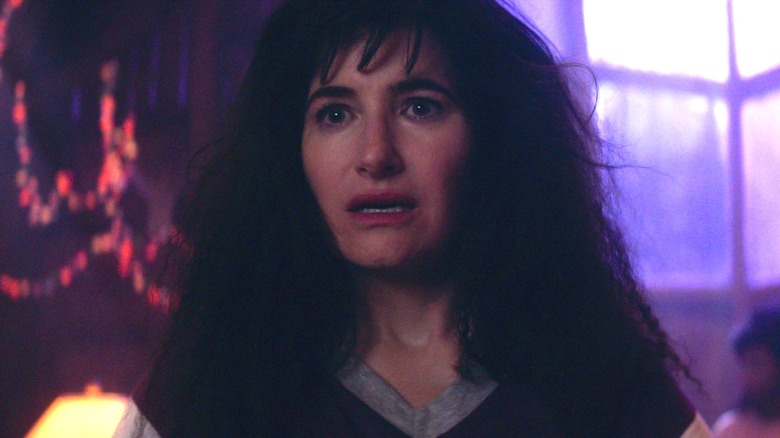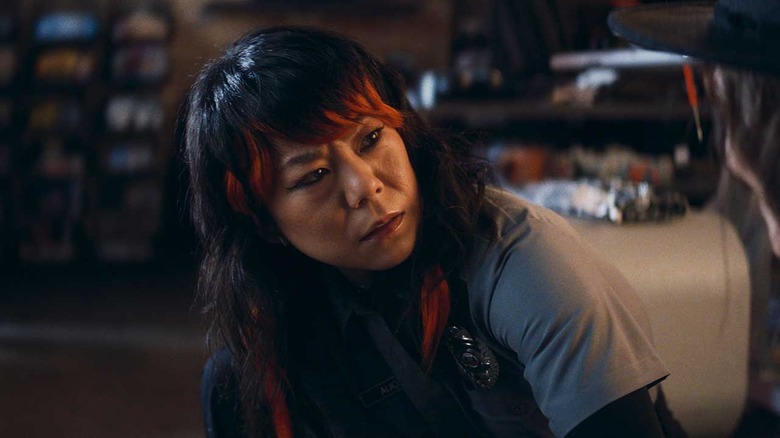Agatha All Along's Big Character Death Needs Some Unpacking
This post contains spoilers for "Agatha All Along."
Just when we thought that "Agatha All Along" would settle for an episodic trial pattern that would feed right into the finale, things get real serious and messy in the latest entry of the show, titled "Darkest Hour/Wake Thy Power." Featuring Agatha's (Kathryn Hahn) trial on the Witches' Road, the episode concludes with a highly-anticipated reveal: Teen (Joe Locke) is Billy Kaplan/Maximoff, and his powers are something to watch out for, given his heritage. The impetus behind this identity reveal lies in the events that occur during the trial, where Agatha's mother, Evanora Harkness (Kate Forbes), possesses her with the intention of keeping her inside the road forever. The root of Agatha's trauma is revealed here, as it can be traced back to Evanora, who fostered enough hatred inside her child to push her towards embracing darkness as a means to instinctively protect herself.
Amid the chaos, where part of the coven wishes to punish Agatha for her transgressions and Teen wants to save her, Evanora attempts to possess Agatha for good but is stopped by the ever-proactive Alice (Ali Ahn), who is finally able to break her generational curse and channel fiery blasts of magic to push Evanora out of Agatha's body. However, for some yet-to-be-revealed reason, Agatha aggressively siphons Alice's power, completely draining her and leaving her dead. This is a shocking turn of events, cruel even for the show's lighthearted, tongue-in-cheek approach to its subject matter, as Alice was the only person in the coven who consistently helped everyone throughout this journey without any covert intentions, and deserved much more.
As Alice's body is left behind (and not buried), with only a seemingly unaffected Rio (Aubrey Plaza) lingering around her offscreen, the series also heavily leans into Rio being Lady Death, who stays behind to collect Alice's body as a part of her duties as a guide to the afterlife. Although Alice might end up returning somewhere down the line, let's talk about the gravity of her death in terms of the repercussions it's had on the characters, becoming an inadvertent catalyst for the group being torn apart and revealed for what it always has been.
Alice Wu-Gulliver still feels indispensable to Agatha's coven
When we first meet Alice, she is introduced as a protection witch disillusioned with the craft after the disappearance of her mother, Lorna Wu (Elizabeth Anweis), who is also the creator of the Witches' Ballad. The Wu generational curse, along with the prospect of seeing her mother again, compels Alice to join Agatha's coven and embark upon the Road, even though she is initially skeptical of everything. Despite her distrust towards the craft and what it stands for, Alice has always been protective of others, often going out of her way to help them out of dangerous situations. She is the only one who pulls Mrs. Hart (Debra Jo Rupp) out of the quicksand mud in episode 3, ensures the group's safety while exiting the room last during the second trial, and frantically draws protection circles around affected coven members during her own trial, ever-ready to shield them from harm. The list of her protective acts goes on.
It's crucial to note that Alice's generational curse was something that weighed upon her all her life, to the point that it became impossible for her to hold down a job or exist in peace. Her trial allows her to break it once and for all, and she does, thanks to her unrelenting bravery and willingness to protect others, no matter what the cost. Alice's death is a shocking one due to its twisted nature: Her act of protection is turned against her into an act of betrayal, where Agatha drains her moments after Alice saves her from eternal doom. This is not just cruel by coven-sisterhood standards, but a gross violation of Alice's inherent goodness, which never seemed engineered or driven by opportunity.
Agatha's shocked, barely-there reaction immediately after Alice's death hints that she might have not been in control when the latter was attacked and killed. However, Agatha's tendency to play into people's worst perceptions of her as an uncompromisingly evil witch doesn't help matters here, especially in light of the rest of the coven treating Alice's death as an eventuality. With the protection witch gone, can the coven even exist as a collective entity — especially now that a wild Billy Kaplan will finally reveal his intentions? Irrespective of his motivations, we share Billy's rage for Alice's unjust death, as someone so gentle and kind-hearted undoubtedly deserved better.

